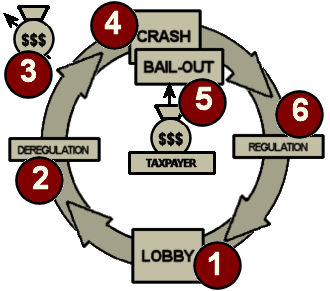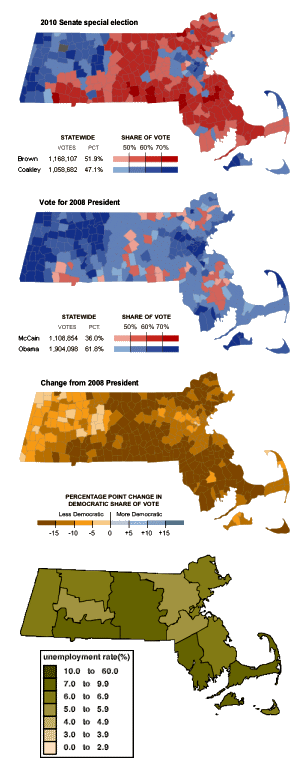Posted on Friday 22 January 2010
For the second time in less than 80 years, the nation’s commercial banks are being told to stick to their knitting. Their knitting is taking deposits, handling checking accounts, lending money and managing the nation’s payment system. Twice now, they have ventured beyond these standard activities, gotten into trouble and almost brought down the financial system. The solution in the 1930s, and once again now, is this: get out of the sideline businesses that caused so much trouble. Those sidelines were different in the 1930s than they are now. And while people talk of re-enacting Glass-Steagall Act — the solution that helped resolve the 1930s crisis — what President Obama proposed this week is a somewhat different animal, worthy of its own name.
The Banking Act of 1933 — forever known as the Glass-Steagall Act in recognition of its sponsors, Senator Carter Glass and Representative Henry B. Steagall — required banks to spin off or shut down their brokerage and investment operations. These operations had lost huge sums in the 1929 stock market crash and in the early years of the Depression. The banks, for example, would underwrite corporate stock offerings, and if they had trouble selling the stock they would buy it with money drawn from depositors’ accounts, sometimes without a depositor’s knowledge.
Or as William Donaldson, a former chairman of the Securities and Exchange Commission, put it in an interview: “If they were underwriting a stock offering and had trouble getting rid of the stuff, they would buy it with people’s deposits.” The restrictions imposed by Glass-Steagall kept bank deposits, and banks themselves, at a safe distance from the markets. But that distance gradually shrank, and in the heady, free-market days of the late 1990s, Glass-Steagall itself was formally revoked.
So commercial banks — the big ones, at least — returned to the Wall Street marketplace. This time they got into trouble by engaging in proprietary trading — that is, the buying and selling of securities for their own account, particularly subprime mortgages packaged as bonds. When that market crashed in 2008, the federal government bailed out the banks, and now the president is asking Congress to bar banks from proprietary trading.
The president is acting on a proposal that Paul Volcker, the former chairman of the Federal Reserve, has been pushing for months. It is sometimes referred to as “Glass-Steagall in spirit.” But the behavior involved and the proposed solution are different enough for the legislation to have its own nickname — and Obama himself has suggested one: “The Volcker Rule”…
A few days after Morgan Stanley reported its first loss in its 74-year history, the bank announced on Friday that its chief executive, James P. Gorman, would receive $8.11 million in deferred stock as part of his bonus for 2009. Mr. Gorman will also receive a further deferred cash bonus, which the bank did not disclose in regulatory filings on Friday. That deferred cash payment will be revealed only when the bank files its proxy statement in April.
A person with knowledge of the matter said Mr. Gorman would probably receive $3 million to $5 million in cash, which would be deferred for three years and could be withheld depending on the bank’s performance. The individual spoke on condition he not be identified because the compensation issue was confidential. The deferred stock portion of Mr. Gorman’s award is valued at Morgan Stanley’s closing share price on Friday but it would be worth significantly more if Morgan’s share price increased…
Opposition Grows Against Second Term for Bernanke
The New York Times
By SEWELL CHAN
January 22, 2010The confirmation of Ben S. Bernanke to a second four-year term as chairman of the Federal Reserve ran into further trouble on Friday as two more Democratic senators said they would vote against him. The White House came to Mr. Bernanke’s defense, but the Senate majority leader, Harry Reid, appeared uncertain about whether there were the 60 votes necessary to confirm Mr. Bernanke before his term as chairman expires on Jan. 31. Mr. Reid said late Friday that while he planned to vote for Mr. Bernanke’s confirmation, his support was “not unconditional.” Senator Christopher J. Dodd, Democrat of Connecticut and the chairman of the Banking Committee, warned Friday that a no vote would send the “worst signal to the market right now,” and could lead to an economic “tailspin.”
In a statement Friday morning, Senator Barbara Boxer, Democrat of California, came out against Mr. Bernanke, who was named to his post during the Bush administration. She said she had “a lot of respect” for him and praised him for preventing the economic crisis from getting even worse. “However, it is time for a change,” she said. “It is time for Main Street to have a champion at the Fed.” “Our next Federal Reserve chairman must represent a clean break from the failed policies of the past,” Ms. Boxer said.
Another Democratic senator, Russell D. Feingold of Wisconsin, also announced Friday that he would vote against Mr. Bernanke. “Under the watch of Ben Bernanke, the Federal Reserve permitted grossly irresponsible financial activities that led to the worst financial crisis since the Great Depression,” Mr. Feingold said in a statement.
Senate Democratic leaders had contemplated trying to hold a vote this week on Mr. Bernanke’s nomination to a second term, but they were forced to hold off after several senators unexpectedly voiced opposition to his confirmation at the party’s weekly luncheon on Wednesday. Democratic leaders asked for a show of hands and, though aides would not provide a precise count, Mr. Reid was said to be surprised at the number..






